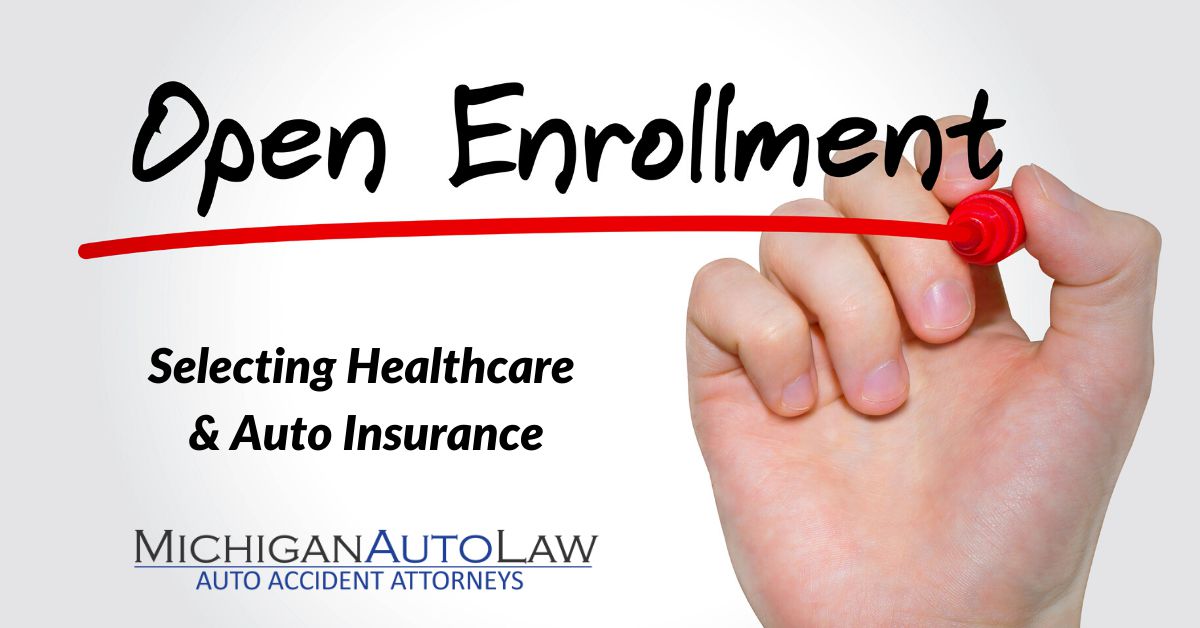
With our new auto No-Fault law in Michigan, the open enrollment period becomes more important than ever. Drivers must understand their health insurance and auto insurance if they are ever injured in a car accident.
Open enrollment is when people can sign up for a health insurance plan to cover them throughout 2020. The open enrollment period normally runs from the beginning of November to mid-December for most people.
But things have now changed. We have a new auto law and health insurance and auto insurance are not the same in the way they allow for necessary medical care for seriously injured car accident victims.
In the past, health insurance open enrollment wasn’t as important because up until now all Michigan drivers have had unlimited No-Fault coverage for any auto accident-related medical expenses.
This changes after July 1, 2020. That makes this open enrollment period and understanding the coverage gaps between your health insurance and auto insurance more important than ever before.
Starting with No-Fault auto insurance policies issued or renewed after July 1, 2020, drivers will now have the option of choosing different levels for No-Fault PIP insurance benefits. They’ll be able to stick with unlimited coverage (which as an auto accident lawyer I strongly recommend for people), or they can opt for lower PIP cap coverage levels of $500,000, $250,000 or $50,000 for drivers on Medicaid. Medicare recipients will be able to opt out of No-Fault PIP medical benefits coverage entirely.
It is important to understand that with lower PIP cap coverage, drivers also lose MCCA reimbursement, which means once you exhaust the money in your selected level of PIP cap coverage, you are now responsible to pay for all the medical bills you incur. However, if you choose the unlimited option, MCCA reimbursement continues, and that means your auto insurance will pay for claims even when the bills and treatment costs run into the millions of dollars.
The reason why health insurance and auto insurance is so significant during open enrollment in 2019 and should be considered during all future open enrollment periods now is because the health insurance plan will have to step up to cover whatever shortfalls that will be created by the auto insurance choices that make drivers after July 1, 2020.
In regard to health insurance and auto insurance, just because you have health insurance doesn’t mean you’re now covered in the event of a car accident. Most health insurance plans will have significant limitations when it comes to covering necessary medical care and medical expenses from automobile accidents. Some will have auto accident exclusions altogether – a trend we will likely see more of in Michigan as employers who provide health insurance for employees revolt at the higher costs of providing health insurance now that health insurance is making up the difference over the PIP cap coverage levels for Michiganders.
So this is a very important decision for people. They will really need to understand the interplay between their health insurance and auto insurance.
My own car insurance advice remains as straight-forward as ever for what people should do to protect themselves and their families in case tragedy strikes and they’re seriously injured in a car accident:
- Keep unlimited No-Fault PIP medical benefits coverage.
- DO NOT coordinate your health insurance and auto insurance. Keep your No-Fault auto insurance as the “primary” payer for auto accident-related medical expenses. It costs a little more, but it is worth it!
In light of the new No-Fault PIP medical benefits coverage levels available in July 2020, I will add the following advice:
- Drivers who choose anything other than unlimited coverage should substantially increase their coverage limits for “uninsured motorist” (UM) and “underinsured motorist” coverage (UM and UIM) to pay for “excess” medical bills caused by a negligent driver with inadequate liability bodily injury limits.
- Likewise, drivers should purchase the highest “residual bodily injury” (RBI) liability coverage they can to protect themselves if they cause a serious car crash. This is the inverse effect of our new auto law. Negligent drivers are now on the hook for far more than pain and suffering. If you cause a million dollars in medical costs because you caused a crash, you are now liable for all the medical costs, future medical costs, and for the pain and suffering of the person you injured. Your exposure has increased significantly because the person you injured may have chosen a lower PIP coverage cap which makes you responsible for everything over that amount of PIP coverage, both now and in the future.
In this blog post, I will discuss some of the coverage issues for health insurance and auto insurance that people should be thinking about during this open enrollment period.
Health insurance and auto insurance for medical care after a car accident
As people are deciding what health plans to choose during the period of open enrollment in 2019, it’s important that they consider what help – if any – a given health insurance plan will provide to them or their families if someone is seriously injured in a car crash.
However, if people follow my advice above about keeping unlimited PIP coverage and uncoordinated No-Fault medical benefits coverage – as well as buying increased UM/UIM limits to properly protect them and their family – then they can take this concern off the table.
Regardless of what is and isn’t covered by their chosen health insurance plan, auto No-Fault insurance will provide the same wide-ranging, unlimited, catastrophic injury coverage that it always has.
The pros and cons of health insurance and auto insurance
There are many serious aspects of health insurance and auto insurance coverage for car accident-related injuries that people must be aware of if they are considering either coordinating their auto and health insurance and/or giving up their “unlimited” No-Fault coverage in July 2020.
Specifically, people should investigate and learn about the following health insurance and auto insurance issues:
- Is there an “auto exclusion” in the health insurance plan I’m considering? (In other words, does the plan specifically exclude coverage for auto accident-related injuries?)
- Is there a “secondary payer” provision in the health insurance plan I’m considering? (In other words, does the plan specify that, no matter what, it will only pay AFTER a person’s car insurance has first been exhausted?)
- On the subject of health insurance and auto insurance, ask yourself what medical treatments, services and care that are routinely covered by No-Fault are not covered by health insurance? Specifically, unlike No-Fault, most health insurance plans do not cover extensive in-home, attendant care (like the 24/7 care that many TBI and SCI survivors are prescribed), door-to-door medical transportation, home and vehicle modifications, long-term speech and cognitive therapy and other long-term care.
- Do I want to be part of a “managed care” plan? Many health insurance companies have managed care plans which means that you cannot choose your own doctors or providers or, if you insist on doing so, then you may have to pay out-of-pocket or receive only minimal coverage through the plan. Also be aware that for the first time, auto insurance will come with a managed care option because of the new auto law. As an auto accident attorney, I can’t emphasize how important it is to NOT choose this option. The doctors that are used by insurance companies to perform so-called independent medical exams are usually anything but independent, and these will likely now be the doctors who will be in charge of deciding your medical care after a car accident if you select the managed care option.
- What are the added costs for the following health insurance-related items: (1) Deductibles; (2) Copayments; (3) Coinsurance; (4) choosing to seek care from an out-of-network doctor or provider; and (5) Out-of-Pocket Maximum?
- Regarding health insurance and auto insurance, if you are seriously injured in a car accident and you cannot return to work, will you lose your job and, thus, your health insurance coverage? If so, then you should think seriously about limiting your car insurance coverage. Many people fail to consider how truly impermanent their employer-provided health insurance is.
- Will I personally end up paying for my medical expenses because of ERISA liens? This is a little-known, but very real and very harsh reality for car accident victims. If you’re injured in a car accident and your employer’s self-funded ERISA (Employee Retirement Income Security Act) health insurance plan pays for your accident-related expenses, then the ERISA plan can file a lien on any recovery you obtain from the at-fault driver for pain and suffering compensation. In other words, whatever you recover in damages from the driver who caused your injuries, you will have to hand to over enough of that recovery to the ERISA health insurance plan to reimburse it for what it spent on your medical care.
Currently, people can “coordinate” their health insurance and auto insurance, which means that they specify that they want their health insurer to pay first for auto accident-related expenses – and their auto insurance company will pay only after the health coverage has been exhausted or reached its limits. Many well-meaning and well-intentioned insurance agents will recommend coordinated health insurance and auto insurance because you will receive a slightly cheaper premium, allowing you to pay less for car insurance.
And, come July of 2020, people will also be able to choose to forfeit their unlimited No-Fault PIP medical benefits coverage in return for a capped coverage level. Presumably, people will choose this option because of so-called “savings” that politicians have promised – though we have yet to see whether and to what extent those savings ever materialize. I have serious doubts about whether we will ever see significant savings.
Health insurance and auto insurance for UM and UIM coverage
In regard to health insurance and auto insurance for Uninsured Motorist coverage and Underinsured Motorist coverage, I’m advising that drivers who give up their unlimited No-Fault PIP medical benefits once the new coverage levels become available should increase their levels of UM and UIM coverage.
Here’s why:
- Without unlimited coverage, drivers’ coverage for accident-related medical expenses will be limited.
- Although the new No-Fault law will give them the right to sue the at-fault driver for their medical expenses in excess of their chosen coverage level, it’s entirely possible that the at-fault driver may be “uninsured” or “underinsured” (because he or she only has PLPD insurance, which doesn’t require liability coverage beyond $20,000/$40,000).
- UM and UIM coverage will pay for the “excess” medical expenses that you would have been able to recover from the at-fault driver had he or she been properly and adequately insured.


